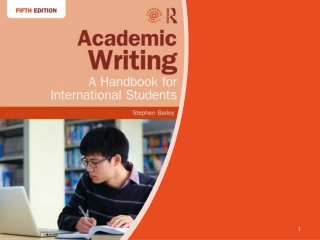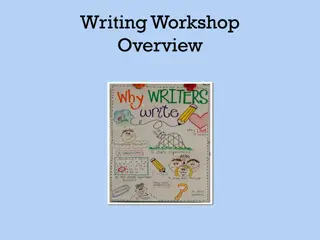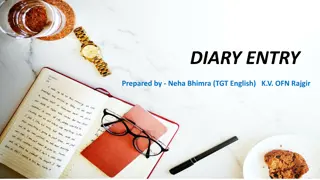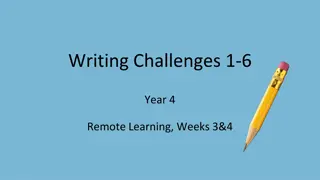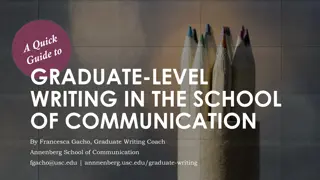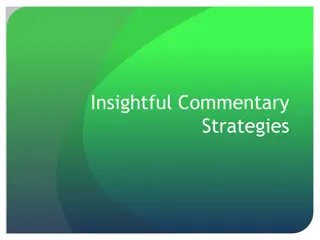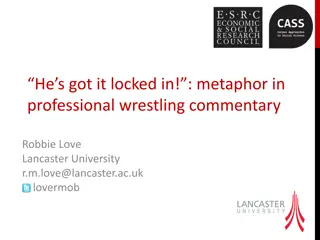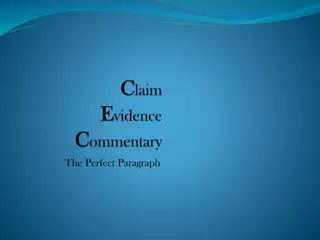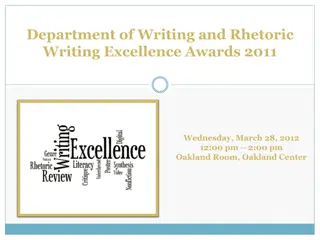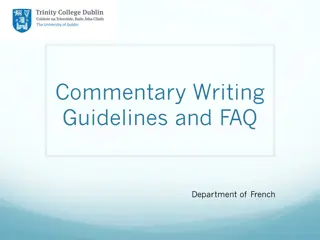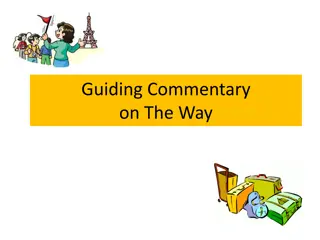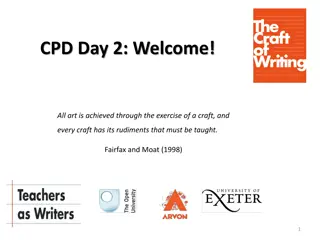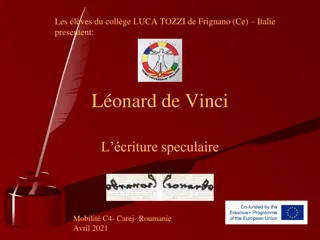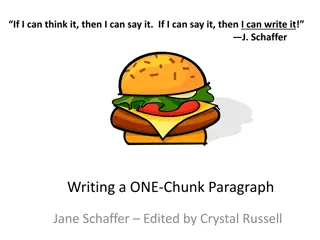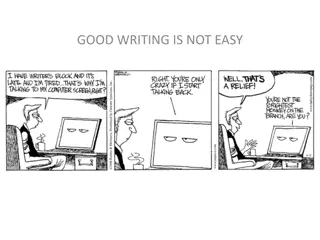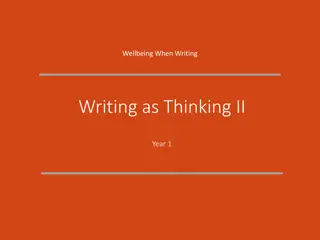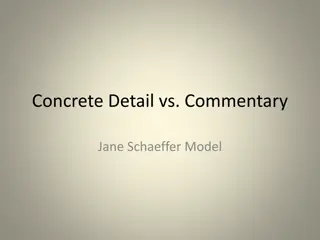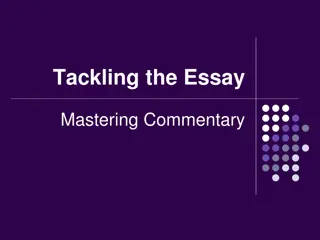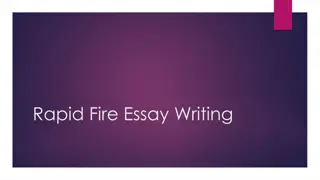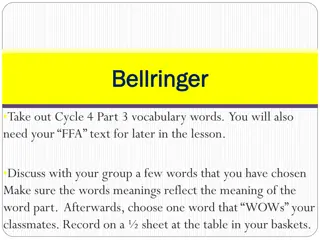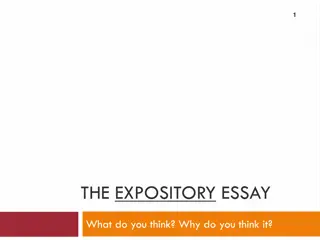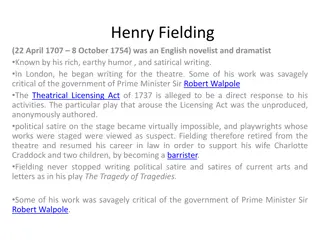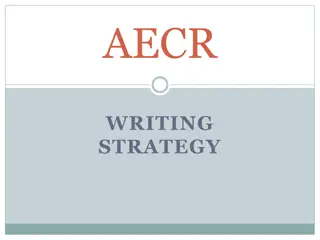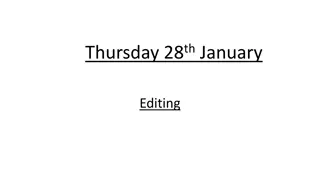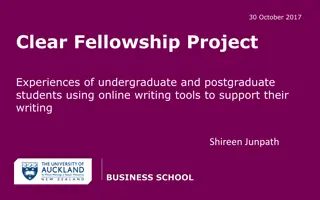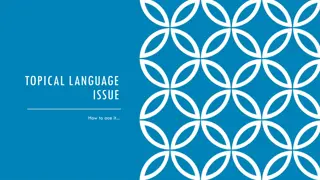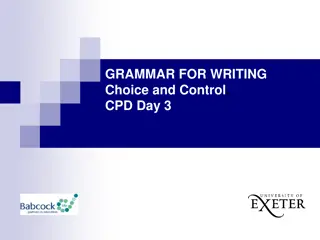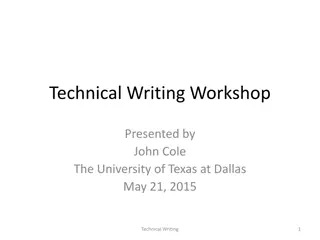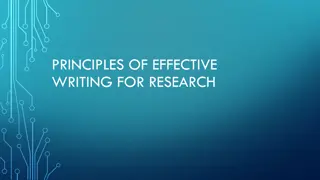Understanding the Academic Writing Process
Explore the stages involved in academic writing, from analyzing the title to proofreading the final draft. Learn about the basics of writing, types of academic writing, common reasons for writing, and text components like paragraphs and citations.
1 views • 42 slides
Exploring Citizen Journalism and Non-Fiction Writing
Explore the world of citizen journalism and non-fiction writing, learning about text types, adapting writing to conventions, considering audience, purpose, and tone. Discover the significance and usefulness of non-fiction writing, and delve into creating various text types. Uncover the role of citiz
1 views • 11 slides
Comprehensive Overview of English Writing Course
This comprehensive English writing course, led by lecturer Muhammad Muslim Nasution, covers various aspects such as grammar, vocabulary, writing styles, and assessments. Students are required to actively participate, submit assignments, attend classes regularly, and produce writing projects. The cou
2 views • 8 slides
Comprehensive Guide to Writing Workshop Essentials
Explore the fundamental elements of a successful writing workshop, including connecting Common Core standards with writing practices, emphasizing the writing process over the final product, establishing a conducive room environment, and providing essential materials for effective writing sessions.
1 views • 18 slides
Guide to Diary Writing: Tips and Examples
Diary writing is a personal form of expression loved by both young and old. The quality of diary writing depends on creativity and imagination. A good diary entry should include day, date, time, a descriptive heading, and be written in first person. Writing informally and experientially adds authent
2 views • 9 slides
Mastering Academic Writing: Strategies for Success
Academic writing is a formal style of writing with specific characteristics such as accuracy, brevity, and clarity. Understanding academic style is crucial for success in your course as it reflects your engagement with the content. Successful academic writers read, learn new vocabulary, and have a s
0 views • 23 slides
Challenges and Perspectives in Academic Writing for English Learners: Insights from Yemeni Students and Educators
Exploring the challenges and experiences of MA English students in academic writing, the narrative reveals issues faced by learners in Yemen such as outdated curricula, lack of teaching aids, and struggles with writing skills. Insights from a teacher highlight improvements in syllabi yet continued c
0 views • 14 slides
Academic Writing Essentials: Background, Types, and Formats
Explore the essential aspects of academic writing in this comprehensive guide. Learn about the purpose of academic writing, common types such as projects and essays, and the formats for short and long writing tasks. Discover the features of academic writing like accuracy, objectivity, and formal sty
4 views • 46 slides
Year 4 Writing Challenges for Remote Learning - Weeks 3 & 4
Engage in a series of creative writing tasks focusing on creating an imaginative character, using imaginative vocabulary, writing a personal letter, using persuasive language, and writing a newspaper report inspired by Chapter 1 to 6 of "The Iron Man." Explore various writing skills while immersing
1 views • 7 slides
Understanding Graduate-Level Writing in Academic Communication
Explore the nuances of academic writing at the graduate level in the School of Communication with Francesca Gacho, a Graduate Writing Coach. Learn about the features, characteristics, and strategies necessary for various genres of writing in this context. Discover the expectations and conventions of
2 views • 30 slides
Mastering the Art of Insightful Commentary
Understanding the differences between summary and commentary, exploring the multifaceted nature of commentary, and following key rules enhance your ability to provide deep, original insights in your writing. Avoid subjective phrases, maintain a 2:1 ratio of commentary to summary, and follow prompts
0 views • 6 slides
The Use of Metaphors in Professional Wrestling Commentary
Metaphor plays a significant role in professional wrestling commentary, shaping how the audience perceives and engages with the sport. This analysis delves into the utilization of linguistic metaphors in the world of professional wrestling and the implications they hold for both the performers and t
0 views • 27 slides
Mastering Effective Paragraph Writing
Learn the essential components of an effective paragraph - Claim, Evidence, and Commentary. Discover how to structure paragraphs to enhance your writing and support your arguments effectively. Explore examples to see how these elements can be applied in practice.
0 views • 19 slides
Creative Teaching Approaches for Persuasive Writing Workshop
The workshop focuses on using Grammar for Writing principles to enhance teaching of persuasive writing, emphasizing modal verbs and adverbials. It encourages creative writing by engaging young writers' imaginations and beliefs, allowing freedom to explore ideas. Participants learn key teaching princ
0 views • 51 slides
Department of Writing and Rhetoric Writing Excellence Awards 2011
The Department of Writing and Rhetoric at Oakland University organized the Writing Excellence Awards in 2011, recognizing outstanding submissions across various categories including writing from/about sources, original research, visual and/or auditory composition, fiction, and creative nonfiction. T
1 views • 42 slides
Mastering Commentary Writing: Essential Guidelines and Tips
Master the art of crafting a compelling commentary by following these guidelines. Understand the preliminary steps, main elements like introduction and main section, and crucial aspects to avoid in order to enhance your commentary writing skills. Dive into the realm of commentary writing with confid
1 views • 21 slides
Comprehensive Guide to Kindergarten Writing Training for NYSESLAT 2019
Explore a detailed guide on Kindergarten Writing Training for the NYSESLAT 2019 exam. The training covers four constructed-response types including Letter Writing, Word Writing, Sentence Writing, and Writing a Story. Gain insights into the application of holistic writing rubrics, analyzing student r
0 views • 24 slides
Guiding Commentary on The Way: Tour Guide Tips and Local Food Insights
In this comprehensive guide, learn tour guide commentary tips covering attractions, landmarks, road conditions, and more. Discover how to indicate positions to tourists and estimate travel times effectively. Explore the vibrant street food culture in Indonesia, from food vendors to local processed f
0 views • 12 slides
Craft of Writing Framework for Teaching Writing
Explore the Craft of Writing Framework to enhance your teaching of writing skills, transforming your Arvon residential experiences into effective classroom strategies. Embrace language choices, text-level decisions, authorship, writing processes, and reader-writer relationships to empower students i
0 views • 39 slides
Enhancing Postgraduate Academic Writing: Feedback Collaboration Model
Developing a collaborative model for postgraduate academic writing courses involves understanding the role of feedback, focusing on content feedback, and exploring the intersections between discipline specialist and writing tutor feedback to improve academic writing abilities. Feedback offers valuab
1 views • 27 slides
Leonardo da Vinci and His Mirror Writing
The students of Luca Tozzi College in Frignano, Italy, explore Leonardo da Vinci's specular writing, a unique form of left-handed writing that can only be deciphered using a mirror. Discover Leonardo's diverse talents as a painter, inventor, scientist, and writer, with a mysterious side to him as a
0 views • 14 slides
Mastering the Jane Schaffer Writing Method
Understand the principles of the Jane Schaffer writing method, including the structure of a ONE-Chunk paragraph, color coding for prewriting, the Chunk format, and the importance of crafting a clear claim supported by concrete details and commentary.
0 views • 17 slides
Mastering the Art of Good Writing
Crafting compelling writing requires attention to detail, from intriguing leads to precise word choices and smooth transitions. Explore the essential elements of good writing, including tips for engaging readers and a checklist for evaluating writing quality. Learn about different types of leads in
0 views • 42 slides
Enhancing Wellbeing Through Writing: Writing as Thinking
Explore the connection between writing and thinking as a vital tool for academic writing. Delve into strategies for effective writing, evaluating its impact on rigorous thinking, and overcoming challenges through reflective writing exercises.
0 views • 34 slides
Understanding the Jane Schaeffer Model for Writing: Concrete Detail vs. Commentary
Learn about the importance of concrete details and commentary in writing according to the Jane Schaeffer Model. Concrete details must be strong, provable facts, while commentary should provide analysis, interpretation, and personal insights that enhance the understanding of the facts. The model emph
0 views • 13 slides
Enhancing Writing Skills at Escrick C of E Primary School
At Escrick C of E Primary School, the approach to English education focuses on core skills like phonics, reading, writing, and letter formation. The curriculum incorporates a variety of text types and genres, including persuasive writing, biographies, fiction, and poetry. Writing activities are embe
0 views • 10 slides
Mastering Essay Commentary: Tips and Ratios
Developing strong commentary is crucial for writing high-level essays. Learn the difference between concrete detail and commentary, maintain the right CD:CM ratio, and understand the restrictions in literature commentary. Use training wheels like starting sentences with "This shows that" to enhance
0 views • 16 slides
Effective Essay Writing Strategy: Rapid-Fire Approach
In this rapid-fire essay writing method, focus on logic and reasoning rather than perfection. Break down the process into structured steps including highlighting supports, crafting the introduction, writing body paragraphs, and addressing opposition and refutation with evidence and commentary within
0 views • 10 slides
Writing in Computer Science Research: Enhancing Technical Writing Skills
This course overview covers the main objectives, class structure, and learning outcomes of a Computer Science Research Writing course focused on developing students' writing abilities, providing constructive criticism, and applying technical writing concepts to research papers in a workshop format.
0 views • 46 slides
Analyzing Characters through AECR Method in Literature Studies
The lesson involves analyzing characters through dialogue and incidents, supported by evidence and commentary using the AECR method. Students discuss vocabulary, choose impactful words, and present arguments such as whether Mary Maloney in "Lamb to the Slaughter" is sympathetic. The Assertion, Evide
0 views • 13 slides
The Power of Expository Writing: Importance and Impact
Expository writing is essential for clear communication and expressing thoughts effectively through written words. This form of writing helps convey ideas, information, and opinions concisely, making it crucial for academic, professional, and personal communication. The structure of expository writi
0 views • 30 slides
The Satirical Legacy of Henry Fielding: A Literary and Social Critique
English novelist and dramatist Henry Fielding is known for his rich humor and satirical writing, which often criticized the government of Prime Minister Sir Robert Walpole. Fielding's works reflected his anti-Jacobite views and support for the Church of England. He delved into writing novels as a fo
0 views • 13 slides
Spring into Writing: Enhancing Writing Skills for Children
Join us for an evening dedicated to enhancing writing skills for children according to Maryland College and Career-Ready Standards. Learn about writing expectations, get motivated writing ideas for children, and explore fun writing opportunities at home. The event will provide insights into differen
1 views • 19 slides
AECR Writing Strategy for Effective Responses
AECR (Assertion, Evidence, Commentary, Restate) Writing Strategy is explained with examples and prompts, guiding readers on how to structure and develop coherent responses. The strategy emphasizes creating a strong assertion, supporting it with evidence from the text, providing commentary to explain
0 views • 8 slides
Learning to Edit and Improve Writing Skills
Today's lesson focuses on editing and correcting mistakes in writing, emphasizing the importance of identifying errors in spelling, punctuation, and grammar. Students are encouraged to review their own work, make necessary edits, and enhance their writing by using synonyms and improving word choice.
0 views • 6 slides
Exploring the Impact of Online Writing Tools on Student Writing Experiences
This project by Shireen Junpath delves into the experiences of undergraduate and postgraduate students using online writing tools to enhance their writing skills. The study aims to understand the effectiveness of tools like Grammarly, Lextutor, and Academic Phrasebank from the perspectives of studen
0 views • 27 slides
Navigating Linguistic Controversies in Modern Discourse
In this guide, you will learn the rules and techniques to excel in topical language writing. From addressing controversial language topics to engaging an intelligent audience, the article delves into the nuances of structuring your writing, using appropriate language registers, and maintaining a cur
0 views • 12 slides
Creative Teaching Approaches in Grammar and Writing Intervention
Re-iterating teaching principles for writing intervention, focusing on grammatical subject knowledge, adverbials, modal verbs, and passive voice. Emphasizing creative teaching methods for persuasive writing, fostering imagination, emotions, and personal beliefs in young writers. Incorporating space
0 views • 60 slides
Comprehensive Technical Writing Workshop by John Cole at The University of Texas at Dallas
Explore the world of technical writing with John Cole, an experienced instructor at The University of Texas at Dallas. This workshop covers the fundamentals of technical writing, including course objectives, programming, course outline, traits of technical writing, and what technical writing truly e
0 views • 58 slides
Writing Research Papers Effectively: Guidelines and Steps
Effective writing for research involves developing a good research idea, writing a literature review, and understanding the key elements of writing research articles. This process includes coming up with a strong research question, gathering relevant information, creating an outline, writing the dra
0 views • 26 slides
